Pas de biographie disponible.
Compositeur Musique additionelle Librettiste Parolier Metteur en scène Chorégraphe Producteur création Producteur version
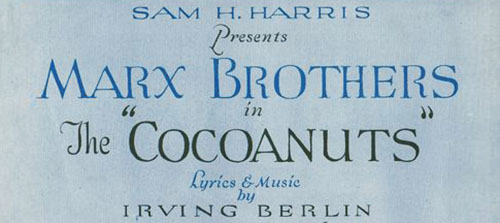
Musical
Musique: Irving Berlin • Paroles: Irving Berlin • Livret: George S. Kaufman • Morrie Ryskind • Production originale: 4 versions mentionnées
Dispo: Résumé Génèse Liste chansons
Genèse: The Cocoanuts was written for the Marx Brothers after the success of their hit Broadway revue I'll Say She Is (1924). The Cocoanuts is set against the backdrop of the 1920s Florida Land Boom des, which was followed by the inevitable bust. Groucho is a hotel proprietor, land impresario, and con man, assisted and hampered by two inept grifters, Chico and Harpo, and the ultra-rational hotel assistant, Zeppo. Groucho pursues a wealthy dowager ripe for a swindle, played by the dignified Margaret Dumont. Produced by Sam H. Harris, the musical was given a tryout in Boston on October 26, 1925, then Philadelphia. The Broadway run opened at the Lyric Theatre on December 8, 1925 and closed on August 7, 1926 after 276 performances. The production was directed by Oscar Eagle, with musical staging by Sammy Lee. After the Broadway closing, the brothers took the show on tour. On June 10, 1926, four new songs and other changes were introduced in the show. The new version, referred to as the "1926 Summer Edition", featured the Brox Sisters, who sang the songs originally assigned to the character of Penelope.[1] A brief Broadway revival played at the Century Theatre from May 16, 1927 to May 28, 1927 with the same creative team. The more famous film adaptation was released by Paramount Pictures in 1929, soon after the addition of synchronized sound permitted talking movies.
Résumé: Cocoanuts se déroule dans l'hôtel Cocoanut, un hôtel de villégiature, pendant le boom des terres en Floride des années 1920 . M. Hammer dirige l'endroit, assisté de Jamison, qui préfère dormir à la réception plutôt que de l'aider à le gérer. Chico et Harpo arrivent avec des bagages vides, qu'ils prévoient apparemment de remplir en volant et en escroquantles invités. Mme Potter est l'une des rares clientes payantes. Sa fille Polly est amoureuse du jeune architecte en difficulté Bob Adams mais cete relation est considérée comme totalement inadmissible par sa mère autoritaire. Il travaille pour subvenir à ses besoins en tant que commis à l'hôtel, mais a des plans pour le développement de toute la zone en tant que Cocoanut Manor. Mme Potter veut que sa fille épouse Harvey Yate, qu'elle croit être d'un statut social plus élevé que Bob Adams. Ce prétendant est en fait un escroc qui cherche à voler le collier de diamants de la douairière avec l'aide de son partenaire de connivence Penelope, mais ils ne sont pas les seuls à y penser. Quand le collier disparaît enfin, le vol est reproché au petit ami. Son innocence est finalement prouvée lorsque les vrais escrocs sont confondus, et les amants reçoivent la bénédiction maternelle.
Création: 8/12/1925 - Lyric Theatre (Broadway) - 276 représ.
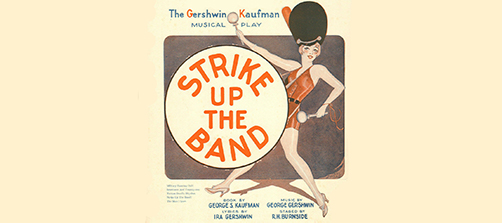
Musical
Musique: George Gershwin • Paroles: Ira Gershwin • Livret: Morrie Ryskind • Production originale: 1 version mentionnée
Dispo: Résumé Génèse Liste chansons
Strike Up the Band is a 1927 musical with a book by Morrie Ryskind, lyrics by Ira Gershwin and music by George Gershwin. It ran in Philadelphia that year, unsuccessfully, and on Broadway in 1930 after the original book by George S. Kaufman was revised. The story satirizes America's taste for war: America declares war on Switzerland over a trivial trade issue.
Genèse: Strike Up the Band is a 1927 musical with a book by Morrie Ryskind, lyrics by Ira Gershwin and music by George Gershwin. It ran in Philadelphia that year, unsuccessfully, and on Broadway in 1930 after the original book by George S. Kaufman was revised. The original book by George S. Kaufman centered on Horace J. Fletcher, a Babbitt-like cheese tycoon who tries to maintain his monopoly on the American market by convincing the United States government to declare war on Switzerland. The story ended darkly. The 1930 plot by Ryskind, softened the political overtones, increased the emphasis on romance and added a happy ending. It relegated the war plot to a dream sequence. The incident that incites war concerned chocolate instead of cheese. During its original 1927 pre-Broadway tryouts, the political satire closed in Philadelphia, fulfilling original librettist's George S. Kaufman's definition of satire as "what closes on Saturday night." The original is heavily influenced by Gilbert and Sullivan. The Gershwins revised the story with Ryskind for the 1930 Broadway run; they also removed the song The Man I Love, now a Gershwin standard, from the show. They added a dozen new songs and rewrote the lyrics or even changed the melodies of many of the 1927 songs. The new score is less Gilbert-and-Sullivan and more swing-influenced. Directed by Alexander Leftwich and choreographed by George Hale, the revised production opened on Broadway at the Times Square Theatre on January 14, 1930 and closed on June 28, 1930 after a moderately successful run of 191 performances. The Gershwins' first fully integrated score for a book musical was influenced by the operettas of Gilbert and Sullivan.
Résumé: Horace J. Fletcher is a manufacturer of chocolates who is aggrieved that Washington has refused to raise the tariff on Swiss chocolates. A doctor gives him a sedative to help him sleep and this he does but the sedative also induces dreams. In his dream he sees himself at the head of an American Army that foes to war with Switzerland over the issue of chocolates. The war was funded by Fletcher who becomes a national hero, but not for long. The American newspapers uncover the unsavoury fact that Fletcher's chocolates use Grade B milk - a fact that shocks the whole nation. Fletcher's daughter Joan has a fiancé, Jim Townshend . Jim is suspicious of Fletcher, and has been from the first time they met. He threatens to expose Fletcher which causes the latter to become an ardent pacifist. This about face comes too late, however, to stop America going to war against Switzerland. The Swiss hotel-keepers are delighted. They are able to raise the prices of their rooms as the American soldiers need lodgings. The war is somewhat phoney as there is never any engagement. The Americans sit in their hotels knitting socks and sweaters for the folks back home. Accidentally, the enemy's secret call to arms is discovered - a yodel - and the American troops are able to corner and rout the Swiss army.
Création: 14/1/1930 - Times Square Theater (Broadway) - 191 représ.
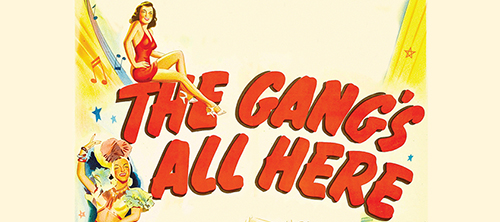
Musical
Musique: Lewis E. Gensler • Paroles: Owen Murphy • Robert A. Simon • Livret: Morrie Ryskind • Oscar Hammerstein II • Russel Crouse • Production originale: 1 version mentionnée
Dispo: Résumé Liste chansons
The Gang's All Here a été un terrible flop. Il a tenu l'affiche moins de trois semaines.
Genèse:
Résumé: Dorita, meneuse de revue brésilienne, est la vedette d'un show à succès au « Club New-Yorker ». Un jeune sergent de l'armée américaine y tombe amoureux d'une des chanteuses de la revue, avant de devoir partir en mission. À la suite d'un quiproquo, celle-ci pense que le jeune homme la trompe, mais sa rivale se révélera finalement n'être qu'une simple amie d'enfance, et tout s'arrange à la fin.
Création: 18/2/1931 - Imperial Theatre (Broadway) - 23 représ.
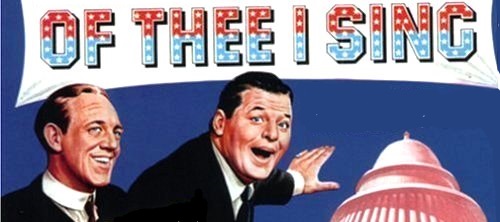
Musical
Musique: George Gershwin • Paroles: Ira Gershwin • Livret: George S. Kaufman • Morrie Ryskind • Production originale: 4 versions mentionnées
Dispo: Résumé Commentaire Génèse Liste chansons
Of Thee I Sing is a musical with a score by George Gershwin, lyrics by Ira Gershwin and a book by George S. Kaufman and Morrie Ryskind. The musical lampoons American politics; the story concerns John P. Wintergreen, who runs for President of the United States on the "love" platform. When he falls in love with the sensible Mary Turner instead of Diana Devereaux, the beautiful pageant winner selected for him, he gets into political hot water. The original Broadway production, directed by Kaufman, opened in 1931 and ran for 441 performances, gaining critical and box office success. It has been revived twice on Broadway and in concert stagings in the U.S. and in London. In 1932, Of Thee I Sing was the first musical to win the Pulitzer Prize for Drama.
Genèse: The Gershwins and George S. Kaufman had collaborated on a satirical musical in 1927 entitled Strike up the Band, which played in Philadelphia. The show concerned a cheese manufacturer who sponsors a war against Switzerland because it will be named after him. A version of Strike Up the Band, with the book altered by Morrie Ryskind, played on Broadway in early 1930. Much of the satire was replaced in the new version by silliness, leading Ryskind to recall, "What I had to do, in a sense, was to rewrite War and Peace for the Three Stooges." Later that year, Kaufman and Ryskind conceived a new musical focusing on satire about rival political parties battling over a new national anthem. The Gershwin brothers agreed to write the score, although they were scheduled to be in Hollywood writing songs for the film Delicious. Kaufman and Ryskind soon realized that their concept did not provide sufficient plot for a musical. They crafted a libretto inspired by the timeless battle of political idealism with corruption and incompetency, creating the first American musical with a consistently satiric tone. The writers and the cast were unsure of what the public's reception would be, prompting Kaufman's now-famous statement, "Satire is what closes on Saturday night." Productions The original Broadway production, directed by Kaufman, opened at the Music Box Theatre on December 26, 1931 and ran for 441 performances. The cast included William Gaxton as John P. Wintergreen, Lois Moran as Mary Turner, Grace Brinkley as Diana Devereaux, Victor Moore as Alexander Throttlebottom and George Murphy as Sam Jenkins. It was produced by Sam H. Harris. Sets were designed by Jo Mielziner, costumes by Carles LeMaire, and dances staged by Georgie Hale. It was Gaxton and Moore's first comedic pairing; they would collaborate on six more Broadway musicals, including Anything Goes. The orchestrations were by Robert Russell Bennett, William Daly (including the "Overture"), and Gershwin ("Hello, Good Morning"). Of Thee I Sing was the longest-running Gershwin show during George Gershwin's lifetime. There were Broadway revivals in 1933 at the Imperial Theatre and in 1952 at the Ziegfeld Theatre, both directed by Kaufman. A concert production of Of Thee I Sing was mounted by Ian Marshall Fisher's Lost Musicals series at the Barbican Centre in London in August 1996. Fisher's series examines the Gershwins' lesser known works (as well as others) and has been based at London's Royal Opera House and Sadler's Wells. The musical was presented in May 2006 as part of the New York City Center Encores! staged concert series. Directed by John Rando and choreographed by Randy Skinner, the cast starred Victor Garber as John P. Wintergreen, Jefferson Mays as Vice President, Alexander Throttlebottom, and Jennifer Laura Thompson as First Lady. The latest revival was in July 2015 at the Royal Festival Hall, London by producer Ollie Rosenblatt as a full musical with orchestra. Diana Devereaux was played by Hannah Waddingham, Wintergreen by Hadley Fraser and Throttlebottom by Tom Edden. The Royal Philharmonic Concert Orchestra provided the new musical setting for the piece. In September 2015 the Sqabbalogic theatre company and Sydney Philharmonia Choirs presented the musical in the Concert Hall, Sydney Opera House.
Résumé:
Acte I
In the U.S. in the 1930s, a campaign parade is taking place to support Wintergreen for President. John P. Wintergreen has been nominated for President and Alexander Throttlebottom has been nominated for Vice President, but he is of such little importance no one can remember who he is. Politicians meet in a hotel room to devise a campaign platform, and when they ask the chambermaid what she cares about, she first says "money," then "love" when pressed further. The men decide that Wintergreen's platform will be "love;" they'll have a pageant to select the most beautiful girl in the United States, and Wintergreen will fall in love and marry her. The pageant begins in Atlantic City, New Jersey, and the contestants wonder, Who is the Lucky Girl to Be? The photographers assure them that even if they do not win, they will surely be loved (The Dimple on My Knee). Wintergreen is getting nervous about marrying a girl he doesn't know. While the girls are at the final judging, he confides in Mary Turner, the sensible young woman running the pageant. He does not want to marry a girl just because she's beautiful; he wants a wife who will make a good home for him and his future children. Mary shares her corn muffin with him. Wintergreen tells Mary that he'd rather marry her than any of the girls in the contest. He kisses her, and she agrees to marry him. The judges of the pageant announce that Diana Devereaux, a beautiful southern girl, has won the contest, but Wintergreen declares that he loves Mary Turner. When he gives some of Mary's extraordinary corn muffins to the judges, they agree that John and Mary are meant to wed (Because, Because). Outside Madison Square Garden in New York City, at a rally for Wintergreen, the campaigners declare that Love is Sweeping the Country. Inside, where politicians are speaking in favor of Wintergreen, a wrestling match is going on just below the speakers' platform as Alexander Throttlebottom tries to explain to the organizers that he's the candidate for Vice-President. Wintergreen proposes to Mary onstage, as he has in forty-seven states before. She accepts again, and Wintergreen sings the campaign song to her, Of Thee I Sing. On election night, Wintergreen wins by a landslide. Inauguration day arrives, which is also Wintergreen's wedding day. As his inaugural address, Wintergreen bids goodbye to the girls he used to know (Here's a Kiss for Cinderella). The Chief Justice presides over the wedding ceremony, and just after he has pronounced John and Mary man and wife, Diana Devereaux interrupts the proceedings. She is serving Wintergreen with a summons for breach of promise. She insists she is the one he should have married (I Was the Most Beautiful Blossom). The Supreme Court rules that Mary's corn muffins are more important than justice in this matter, and Diana angrily leaves to tell her story across the nation. Wintergreen leads the Supreme Court and spectators in a chorus of Of Thee I Sing.Acte II
John and Mary settle down to business in the White House. Her "desk," back-to-back with his, is a fully loaded tea-table. Their secretaries greet each other "Hello, Good Morning." Alexander Throttlebottom, now Vice-President, sneaks into the White House with a tour group. When a guide tells him that the Vice-President's job is to preside over the U. S. Senate, Throttlebottom eagerly dashes off to the Capitol. Wintergreen's fellow party members inform him that Diana Devereaux is gaining support across the nation. Wintergreen holds a press conference and tells the reporters that his love for Mary is the only thing that matters (Who Cares?). The French ambassador unexpectedly arrives (Garçon, S'il Vous Plaît). He has a surprise for Mr. Wintergreen: Diana is "'The Illegitimate Daughter' of the illegitimate son of the illegitimate nephew of Napoleon." He insists that Wintergreen annul his marriage and marry Diana to right his grievous offense against France. Everyone agrees that Wintergreen should be impeached for breach of promise (We'll Impeach Him), but John and Mary do not care, since they have each other (Who Cares?" (Reprise)). Throttlebottom has found the Senate, and the party members inform him that he will soon be President. He is very excited and goes into the Senate Chamber to preside, beginning by taking "The Roll Call." The resolution on the impeachment of the President is brought up, and the French Ambassador and Diana mournfully insist that she was Jilted. Mary saves the day when she announces that she is pregnant (Who Could Ask For Anything More?). The senators refuse to impeach an expectant father, and Wintergreen declares that Posterity is just around the corner. The French Ambassador informs Wintergreen that by not marrying Diana, he has contributed to France's declining birth rate. He demands the Wintergreens' baby as a replacement for the one they have "taken" from France. John refuses, and the ambassador walks out. In the Yellow Room of the White House, guests are arriving bearing gifts for the baby (Trumpeter, Blow Your Horn). Wintergreen is nervously awaiting the baby's birth when the French Ambassador arrives with a final message from France: surrender the baby or France will sever diplomatic relations with the U.S. The Supreme Court justices, who have the duty to determine the sex of the baby, announce that twins have been born, a boy and a girl. The French ambassador is even more wounded by this proclamation: France has lost two babies instead of one! Diana mournfully joins him, and Alexander Throttlebottom arrives bearing sweaters for the babies. The French Ambassador is about to declare war when Wintergreen has a brilliant idea: according to Article Twelve of the Constitution, when the President of the United States is unable to fulfill his duties, his obligations are assumed by the Vice-President! The ambassador calls Wintergreen a genius, and Throttlebottom is ecstatic as they pass Diana over to him. Servants wheel a large bed into the room, where Mary sits with the babies. Wintergreen leads everyone in proclaiming, "Of Thee I Sing."Création: 26/2/1931 - Music Box Theatre (Broadway) - 441 représ.
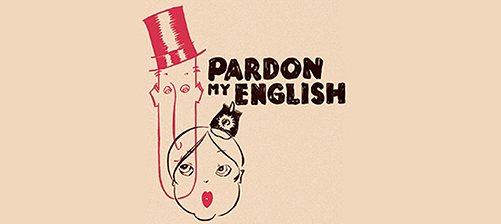
Musical
Musique: George Gershwin • Paroles: Ira Gershwin • Livret: Herbert Fields • Morrie Ryskind • Production originale: 1 version mentionnée
Dispo: Résumé Génèse Liste chansons
Genèse: Producers Alex A. Aarons and Vinton Freedley approached the Gershwins to create a showcase for the talents of English music hall star Jack Buchanan, and linked them with Fields and Ryskind, whose book required the actor to appear in dual roles, lower-class German thug Golo Schmidt and upper-crust British nobleman Michael Bramleigh. The sophisticated Buchanan had no problem portraying Bramleigh but was unable to capture the essence of Schmidt. The show opened in Philadelphia to critical pans. Rather than proceed to Broadway, the creative team added characters and expanded the role of police commissioner Bauer, played by radio's "Baron Munchausen", Jack Pearl. The revised production opened in Newark on January 2, 1933, but it was obvious that Buchanan was still a major problem. He bought out his contract and the producers replaced him with dialect comedian George Givot. The production opened on Broadway on January 20, 1933, at the Majestic Theatre and ran for 43 performances. The book was directed by John McGowan, the production was staged by producer Vinton Freedley, and the musical numbers were staged by George Hale. In addition to Givot and Pearl, the cast included Josephine Huston as Bauer's daughter Ilse and musical-comedy star Lyda Roberti (her speciality was a "polyglot of Polish, German, and near-Hungarian") as Gita Gobel. According to Ben Brantley, "By the time it hit Broadway it was a desperately stitched patchwork that ran for 33 performances before exiting into oblivion. It was, Ira Gershwin later wrote, 'a headache from start to finish'." The critics unanimously condemned it. In 1982, a producer discovered a number of the musical's manuscripts in the Warner Brothers warehouse in Secaucus, New Jersey. The score was pieced together and performed at the Library of Congress in concert in 1987. Elektra Records released a studio cast album featuring John Cullum and William Katt in 1993. New York City Center's Encores! presented a staged concert in 2004, with a revised book by David Ives. Directed by Gary Griffin and choreographed by Rob Ashford, it featured Brian d'Arcy James as Golo/Michael, Emily Skinner as Gita, Jennifer Laura Thompson as Frieda (originally Ilse), and Rob Bartlett as Bauer. 42nd Street Moon, San Francisco, California, presented a staged concert in November 2006. The European premiere took place on November 29, 2009, at the Dresden State Operetta in Dresden, translated by Wolfgang Adenberg, directed by Holger Hauer and conducted by Ernst Theis.
Résumé: In order to promote the sale of beer and wine, the German government bans the sale of all non-alcoholic beverages. In retaliation, Golo Schmidt opens Club 21, a speakeasy where patrons can imbibe such forbidden drinks as cream soda and ginger ale. Police Commissioner Bauer makes it his mission to shut down the illegal operation. Golo decides to disrupt a birthday celebration for Bauer, but while en route to the party he is struck by a car and knocked unconscious. When he awakens in Bauer's home, he believes he is Michael Bramleigh, a wealthy, sophisticated member of British society. He eventually falls in love with Bauer's daughter Ilse and proposes marriage. A birdhouse falls on Bramleigh, and his memory returns. Golo once again, he has no memory of his relationship with Ilse and returns to Club 21 and his sweetheart Gita Gobel. Hearing Bauer's daughter is about to marry, he plans to kidnap the bride and hold her for ransom. At the wedding, Golo locates Ilse, who naturally thinks he's her fiancé Michael, and the two escape to an inn in Schandau. Golo, inexplicably thinking he's Michael once again, returns to Bauer's house and apologizes for missing the wedding. The two plot to find Ilse and save her from her kidnapper. Recognized as Golo by some and Michael by others, the hero becomes involved in a series of comic misadventures.
Création: 20/1/1933 - Majestic Theatre (Broadway) - représ.
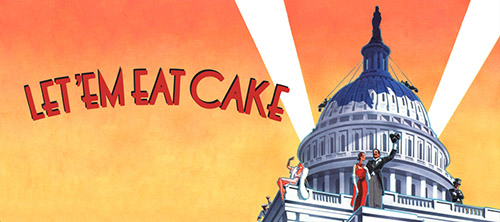
Musical
Musique: George Gershwin • Paroles: Ira Gershwin • Livret: George S. Kaufman • Morrie Ryskind • Production originale: 1 version mentionnée
Dispo: Résumé Génèse Liste chansons
Genèse: The original Broadway production of Let 'Em Eat Cake opened October 21, 1933 at the Imperial Theatre, New York City, USA and ran for 89 performances. It had The cast included William Gaxton as J.P. Wintergreen, Victor Moore as Alexander Throttlebottom, Philip Loeb as Kruger, and Lois Moran as Mary Wintergreen. The no longer extant orchestrations were by Edward B. Powell. The show carried a message that audiences did not want to hear and it was a failure. However, it did have one song: "Mine". Several musical themes from Of Thee I Sing are reused in Let 'Em Eat Cake, including the Supreme Court Judges' song and the campaign song "Wintergreen for President", which includes parts of folk and patriotic songs such as Sousa's "Stars and Stripes Forever", and "Hail, Hail, the Gang's All Here." A concert version of the show was performed on BBC Radio in 1994 (with a cast that included: Denis Quilley, Kim Criswell, Joss Ackland, Henry Goodman, and Louise Gold), and Opera North staged the show, along with a revival of Of Thee I Sing, during its 2008–9 season. The Opera North production was broadcast by BBC Radio 3 on Saturday, 26 September 2009, as part of its Opera on 3 series.
Résumé:
Acte I
President Wintergreen is up for reelection, but due to the continuing Great Depression, loses in a landslide to John P. Tweedledee. Wintergreen makes an unsuccessful appeal to the Supreme Court to overturn the election results. It is also revealed that Diana Deveraux divorced Throttlebottom to marry the French Ambassador. After the end of his term, Wintergreen, Throttlebottom, and their associates start a business selling his wife Mary's blue shirts on "Union Square." At Union Square, Kruger, an agitator, is proclaiming his doctrine "Down with Everything That's Up." After talking with Kruger, Wintergreen decides that to increase shirt sales they should promise a revolution or their money back, citing the European Brown Shirts and Black Shirts. With business now booming ("Shirts by Millions"), Mary appeals to the women to join the New Blue D.A.R. ("Climb up the Social Ladder") to increase female shirt sales. Wintergreen now needs the support of the Union League Club, because General Snookfield is a member. Throttlebottom persuades them by saying that the British are attacking Bunker Hill ("Comes the Revolution Reprise"). Having secured the Union League Club support, The Blue Shirts meet with Snookfield to plan the overthrow of the government ("On and On and On"). At nine o'clock on July 4, when the Blue Shirts arrive, Snookfield will give the signal for his soldiers to seize Tweedledee. On the Fourth, at the White House grounds, Tweedledee is giving a speech, when Snookfield leaves with Trixie for a party. The Blue Shirts arrive only to find the general is missing and the soldiers don't know what to do. Tweedledee promises the army a "dollar a day which (he) may not pay." Wintergreen promises the army the war debts owed by the League of Nations, which the soldiers accept. Tweedledee is deposed, and Wintergreen declares that "the land of freedom is free once more" ("Let 'Em Eat Cake").Acte II
The White House is being painted "Blue, Blue, Blue." The Supreme Court, now in chains, are brought before Wintergreen. He decides to show leniency because the Court officiated his marriage ceremony. The Court is reorganized into a baseball team. When the League of Nations arrives to discuss repayment of the war debts, they "No Comprenez, No Capish, No Versteh" when the issue is raised; only Finland repays their debt. Kruger, now head of the army following Snookfield's disgrace, is also putting pressure on Wintergreen to remember his promise. Wintergreen offers a solution where the debts will be settled by a baseball game for double or nothing. If the League loses, they will have another conference to discuss it. Kruger accepts the League's offer of Finland's money as a side bet. Throttlebottom hesitatingly accepts an offer to be the game's umpire. On the date of the ballgame the Supreme Ball Players, the League, and Kruger's army try to influence Throttlebottom to bend the rules their way. The United States loses the game after a controversial call by umpire Throttlebottom. The soldiers want someone to be held to account for the loss, over Wintergreen and his associates' objections ("Oyez, Oyez, Oyez"). In the "Trial of Throttlebottom" a military tribunal is underway. Kruger, the Army, and the Ball Players call for Throttlebottom's execution claiming he conspired with the enemy. Wintergreen and his associates object, until the army levels the guns at them. Kruger and the army want to know when they are going be paid ("A Hell of a Hole"). After Wintergreen offers them a share of the shirt business, the army is going to take it all (Down With Everything That's Up—Reprise). Despite pleading he tried his best to get the money ("It Isn't What You Did"), Kruger sentences Wintergreen and his cronies to death by beheading. Mary and the condemned's wives enter and proclaim they are pregnant. Kruger says this may have worked four years ago during Wintergreen's impeachment hearings, but it doesn't work with the army. Trixie, who controls the Navy, arrives and joins forces with Kruger ("First Lady and First Gent"). Kruger proclaims "Let 'em Eat Caviar." Execution day arrives, and in their jail cell Wintergreen, Throttlebotton, and the Committee discuss how they ended up in this situation. Next, the crowds gather to watch the executions ("Hanging Throttlebottom in the Morning"). A guillotine bought from France is unveiled, and Snookfield is shown to be the executioner. Since Throttlebottom is not married, he will be executed first. After a series of mishaps with the guillotine, Mary interrupts the proceedings. She presents a "Fashion Show" with dresses that arrived on the boat that brought the guillotine. After being reminded that the color of the revolution is blue, and they cannot wear the new fashions, the women revolt. Kruger objects, but the soldiers seize him after Trixie reminds them of an upcoming party. Wintergreen tells the soldiers to shoot Kruger. When Kruger reveals he used to be in the dress making business, Wintergreen decides to go into business with him. Wintergreen decides to leave the revolution business and restores the republic and the Supreme Court. Tweedledee shows up and Wintergreen gives his vice-president, Throttlebottom, to him, since he can't remember his. Tweedledee declines the Presidency, since he is going to be President of Cuba. Throttlebottom is now the President. After Wintergreen promised the people cake and Kruger promised them caviar, Throttlebottom promises them pistache ice cream, which he formerly detested.Création: 21/10/1933 - Imperial Theatre (Broadway) - 90 représ.
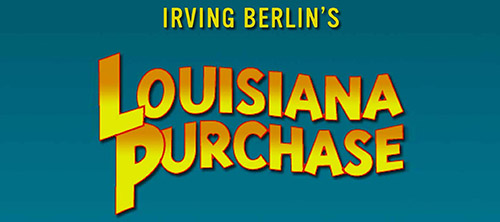
Musical
Musique: Irving Berlin • Paroles: Irving Berlin • Livret: Morrie Ryskind • Production originale: 1 version mentionnée
Dispo: Résumé Commentaire Liste chansons
Le délicieux Louisiana Purchase d’Irving Berlin a reçu quelques-uns des meilleurs avis de la saison 1939-1940 et est devenu la plus longue série de cette saison avec 444 représentations.
Genèse:
Résumé: Cette aimable comédie parle du sénateur du New Hampshire Oliver P. Loganberry (rôle créé par Victor Moore) qui part en mission en Louisiane pour enquêter sur les irrégularités financières de politiques locaux dont l’un, Jim Taylor (joué par William Gaxton à la création), s’avère ne pas être un si mauvais gars après tout. Afin d’étouffer l’enquête de Loganberry, les politiciens locaux tentent de le compromettre dans des relations avec diverses femmes, dont la belle Marina (Vera Zorina) et l’expérimentée Madame Bordelaise (Irene Bordoni). Mais Loganberry, en apparence confus et maladroit est en fait astucieux et, non seulement, il nettoie la politique locale, mais se trouve aussi une épouse en la personne de Madame Bordelaise. Jim Taylor et Marina formeront un deuxième couple d’amants heureux mais, pour «parfaire l’intrigue», un troisième couple de formera!
Création: 28/5/1940 - Imperial Theatre (Broadway) - 444 représ.

.png)
.png)




